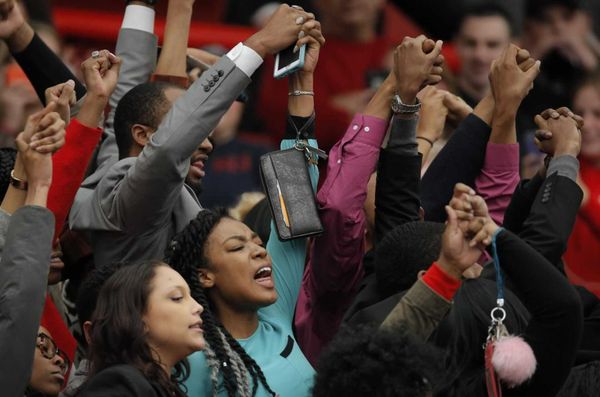It has been just over a week since the shocking results of the United Kingdom’s Referendum on the E.U., and people are still trying to figure it out what it means. I, for one, never anticipated that the British people would be so easily overtaken by anxiety and fear, but that is precisely what has occurred. To many, the “Brexit” represents a disturbing trend toward right-wing political movements across the world, whether it be in Europe, Asia, or the United States.
In the case of the United Kingdom, you had a coalition of upper-class white voters led by Boris Johnson and Nigel Farage, who promoted a message of xenophobia and blatant lies to lead a divided nation out of the relative safety of the European Union.
Comparing this to the United States, you can see similar stains of growing inequality, general economic anxiety and anti-immigration paranoia, which can allow messages like Farage’s or Trump’s to really resonate with certain groups of people across our society. When I first started listening and reading the coverage of this story (which was hard not to do), I was also struck by the very same parallels between the rise of the Leave campaign and Donald Trump.
However, making this comparison would be far too simplistic. President Obama even came out this week, noting that the differences are greater than the similarities between Brexit and the sentiments in the U.S. One key difference, that often goes unnoticed, is that England’s relationship with the rest of Europe and the E.U. had always been rocky. They never converted to the Euro, keeping their currency of the pound sterling, and there is a history of leaders of most of major political parties being heavy euro-skeptics. Still, I feel like a more direct example of what is likely to occur in the 2016 presidential contest comes from the 1991 Louisiana Gubernatorial election.
Some of us may remember Donald Trump’s strange decision to lie about whether or not he would disavow endorsements made by former Grand Wizard of the Ku Klux Klan David Duke. I remember at the time that this has to be the event that sinks Trump, but as I was time and again throughout the primary season, I was wrong. For those who may not remember, during a 2016 interview with CNN’s Jake Tapper, Trump claimed that he didn’t “know anything about David Duke.” Trump, as is generally the case, was proven to be a liar as multiple clips, headlines, and articles were quickly discovered that showed him acknowledging Duke as “a bigot, a racist, a problem," among other things.
If you look further into these comments, you can see one interview from 1991, with Larry King, discussing the Louisiana Gubernatorial results that really stands out. A short snippet of this exchange reads like this:
CNN’s Larry King: “Did the David Duke thing bother you? Fifty-five percent of the whites in Louisiana voted for him.”
Trump: “I hate seeing what it represents, but I guess it just shows there’s a lot of hostility in this country. There’s a tremendous amount of hostility in the United States.”
King: “Anger?”
Trump: “It’s anger. I mean, that’s an anger vote. People are angry about what’s happened. People are angry about the jobs. If you look at Louisiana, they’re really in deep trouble.”
This interview might lead you to ask, much like I did: What exactly happened in 1991? Well, David Duke, a man with a long and elaborate history of association with the Nazi party and the Ku Klux Klan, was running against Edwin Edwards, an untrustworthy and former three-time governor.
I feel like Edwards is an interesting character, especially when comparing him to Hillary Clinton. While currently some people, me not included, view Clinton as “Crooked Hillary,” Edwards actually, at that time, had testified more than 15 times before grand jury investigations and had twice been tried, on felony racketeering charges, before being acquitted in 1986. These investigations would lead to one particularly humorous aspect of the 1991 campaign, where voters would put bumper stickers on their cars reading,“Vote for the crook. It’s important," perhaps the Clinton campaign should take this message up to draw in some undecided and Bernie voters.
Of course, joking aside, it should be noted that Edwards would eventually be convicted in 2000 of racketeering, extortion and fraud charges for demanding payoffs for gaming licenses. These charges would cause him to serve eight and a half years before being released in 2011. Not to be outdone, Duke also served a year in prison in 2003 and 2004 for mail fraud and filing false tax returns.
For all of the racism and bigotry in his past, Duke was running on a similarly anti-establishment message as Trump is today. Lawrence Powell, a Tulane University professor who co-chaired a group called the Louisiana Coalition Against Racism and Nazism, recalls that Duke was mainly playing on economic anxiety as Louisiana’s oil patch had collapsed. These feelings were then exacerbated by national politicians, who were stirring up angry rhetoric about welfare queens, and voters who felt shut out of prosperity and were thus frustrated with the system.
And just like with Trump, to Duke’s supporters, nothing he did, nothing he said would sway them from him. Quin Hillyer, a Louisiana journalist, noted that, “when their guy is attacked, they rally around him even stronger.” Hillyer goes on to state that, “The majority of Trump supporters, and the majority of Duke supporters, were good Americans expressing reasonable frustrations with decent motivations.”
Still, Duke’s past, as it should have been, was too much to ignore for many groups. This led to hundreds of advertisements showing his explicit racist attitudes. Eventually, establishment Republicans and Democrats, alongside African-Americans, banded together to defeat Duke in the 1991 election. This movement not only led to the humorous bumper sticker described earlier, but to the highest voter turnout in the history of the state for a gubernatorial election, with roughly 80 percent of registered voters going to the polls. To break it down a bit more, Edwards received 61 percent of the vote, or 1,086,820 votes, while Duke got 39 percent, or 701,024 votes.
There were two main factors that led to an Edwards victory based on exit polls from that day. The first factor is that, he easily won the black vote. Reporter Jim Cummins made the comment that, “he got almost all the black votes in Louisiana.” The other factor was that he received, according to Cummins, “Half—he got half of the Republican vote, even though he’s a Democrat. He got three-quarters of the vote that went for Buddy Roemer, the incumbent governor who lost in the primaries.”
While this may have been the path for a Edwards to win a governorship, even though he was viewed as a crook by nearly half of Louisiana voters, it may also succeed for Hillary. Based on a recent poll, one percent of Black voters support Trump, given his rhetoric. However, it doesn’t stop there, as Latino voters view him nearly as unfavorably, but what may be important is the attitudes of Trump’s supporters. Nearly half of self-declared Trump supporters in a Reuters poll reported that the Black community is more violent and criminal, and "lazy" was just a few points behind. This is similar to attitudes expressed by Duke supporters in 1991, where 93% were fervently against any type of hiring preference given to African-Americans, among other things.
But unlike the Edwards win, I do not think that Clinton could carry anywhere close to fifty percent of the Republican vote. Now, that does not mean that she does not have a chance to capture a decent margin, especially with Trump seemingly refusing to rally the party around him, instead telling them to “shut up,” if they do not automatically agree and approve of him.
However, this could be a grave mistake for Trump, as many G.O.P. politicians and voters are still very much in the #NeverTrump camp. This refusal to bring the party around to him could not only lead to significant turmoil at the Republican National Convention, but also to traditionally red states turning blue, especially out west. Two states that we should be watching are Arizona and Utah, which have reliably voted Republican in recent presidential elections, but might not for the first time in quite a while.
So, even though I feel like the Brexit may not be the most direct comparison to our current political situation, it should still serve as a wake-up call to the fact that these far right movements around the world do not exist on a fringe level, but can actually win in Western nations. While I still do not think Trump has a clear path to victory in November, what does concern me is what his movement will mean moving forward. Jeremy Alford wrote in the New York Times that even though Duke lost in 1991, Louisiana “Republicans have sought and eventually won Mr. Duke’s voters, while turning their back on him,” thus bringing his message more into the mainstream.
This question is only made more urgent by the recent revitalization of the Ku Klux Klan, who recently celebrated the 150th anniversary of its founding. This all brings us back to the relationship between Duke and Trump. Trump, who has been called “Our Glorious Leader” by Neo-Nazi groups, was at one time was willing to call him out on his past, but not so much anymore. What will this mean for race relations going into future, and how will the Republican Party change? What I want is for hope and optimism to defeat fear and hatred, but your guess is as good as mine. Unfortunately, if Louisiana is any indication, it may not be so easy to cover up the ugliness of our inner thoughts once they are truly revealed.




















